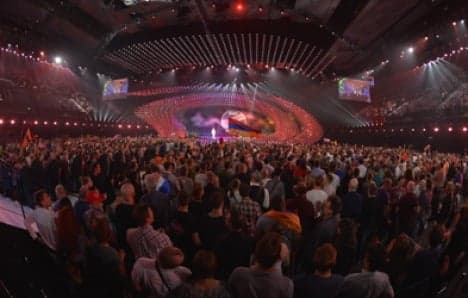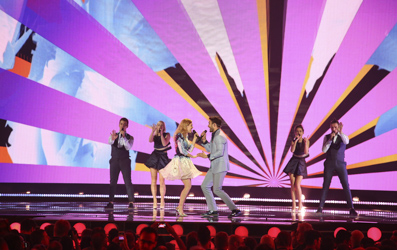Eurovision: A stage for geopolitical conflicts?

Behind the kitsch, glitz and smoke machines of the Eurovision Song Contest - hosted on Saturday by Vienna - hide more serious international geopolitical tensions, says the creator of the world's first university course on the popular music competition.
Historian Dean Vuletic leads a EU-funded research project at the University of Vienna, focusing on the annual Eurovision sing-off as a vehicle for diplomacy and socio-political messages.
"It is an effective tool to approach history because it prompts people to talk about political issues through cultural references," Vuletic told AFP in an interview.
For instance, it served as "a great mirror" for the complex relationship between the West and Soviet states during the Cold War.
Communist Yugoslavia's entry into Eurovision in 1961 -- barely six years after the contest was first launched -- helped demonstrate that it was the Eastern European nation most open to Western cultural influences back then, Vuletic argued.
"It was the only communist country that participated in it throughout the Cold War," he said.
Meanwhile, Austria sent a "highly symbolic message" in 1968, when Soviet tanks crushed the Prague Spring, by sending Czech singer Karel Gott as its representative.
"From the Austrian perspective, it was an expression of support for the reforms that were taking place and desire for closer ties with its eastern neighbours," said Vuletic.
The following year Austria boycotted the contest because it was being held in Spain, then under the dictatorship of Francisco Franco.
After the fall of the Iron Curtain, Eurovision gained even greater political significance as countries of the former Eastern bloc began joining the European Broadcasting Union (EBU), which organises the song contest.
Accession was easy because the group had no political or economic entry requirements -- all a country needed was a public television service.
"From the early 1990s, it was really the first Western European organisation that former communist nations could enter," said Vuletic.
"They used it as a forum, in which they could express and affirm their aspirations for European integration."
Once these countries became members of NATO and eventually the European Union, however, Eurovision lost its lustre: "You can see that many of them stopped putting so much effort into the contest after their political aims were accomplished."

A scene from the dress rehearsal for the second Semi Final. Photo: Thomas Hanses (EBU)
'We Don't Wanna Put In'
In more recent times, tensions between the West and Russia have flared up again, notably over Ukraine, and this too is being played out on the Eurovision stage.
At the 2014 competition in Copenhagen, just two months after Russia annexed Ukraine's Crimean peninsula in March, Russia's Tolmachevy Sisters were booed by the audience in the final.
In contrast, Austria's bearded drag queen Conchita Wurst was wildly cheered and went on to win the contest.
Conchita "profited from the tensions between Russia and the West by presenting herself as a symbol of Western liberal values" -- especially in light of Russia's strong anti-gay stance -- said Vuletic.
Russia appears to fare better this year with singer Polina Gagarina, whose peace song "A Million Voices" was voted into Saturday's final in Vienna to loud applause.
While the EBU welcomes entries dealing with positive political themes, overtly critical or nationalist content is strictly forbidden.
Lyrics often tread a fine line here, such as the 2015 entry by finalist Armenia.
Many perceived the song, originally called "Don't Deny," to be a direct reference to the 100th anniversary of the mass killing of Armenians by Ottoman forces, which Turkey refuses to recognise as genocide.
In the end, Armenia changed the title to "Face the Shadow" to remove any suggestion of political intent.
Other nations have tried to find more creative ways of getting around the "no politics" rule.
Georgia attempted to join the 2009 edition in Moscow with the song "We Don't Wanna Put In". The EBU rejected the entry on the basis it was an obvious wordplay on Putin.
For Vuletic, the ideal Eurovision song carries a "strong universal message at the right historical time".
"Nationalist messages don't do well because they're not something that other Europeans can necessarily relate to."
By Nina Lamparski/AFP
We will be reporting live and blogging from the Eurovision Song Contest final on Saturday - check in at 8.50pm!
Comments
See Also
Historian Dean Vuletic leads a EU-funded research project at the University of Vienna, focusing on the annual Eurovision sing-off as a vehicle for diplomacy and socio-political messages.
"It is an effective tool to approach history because it prompts people to talk about political issues through cultural references," Vuletic told AFP in an interview.
For instance, it served as "a great mirror" for the complex relationship between the West and Soviet states during the Cold War.
Communist Yugoslavia's entry into Eurovision in 1961 -- barely six years after the contest was first launched -- helped demonstrate that it was the Eastern European nation most open to Western cultural influences back then, Vuletic argued.
"It was the only communist country that participated in it throughout the Cold War," he said.
Meanwhile, Austria sent a "highly symbolic message" in 1968, when Soviet tanks crushed the Prague Spring, by sending Czech singer Karel Gott as its representative.
"From the Austrian perspective, it was an expression of support for the reforms that were taking place and desire for closer ties with its eastern neighbours," said Vuletic.
The following year Austria boycotted the contest because it was being held in Spain, then under the dictatorship of Francisco Franco.
After the fall of the Iron Curtain, Eurovision gained even greater political significance as countries of the former Eastern bloc began joining the European Broadcasting Union (EBU), which organises the song contest.
Accession was easy because the group had no political or economic entry requirements -- all a country needed was a public television service.
"From the early 1990s, it was really the first Western European organisation that former communist nations could enter," said Vuletic.
"They used it as a forum, in which they could express and affirm their aspirations for European integration."
Once these countries became members of NATO and eventually the European Union, however, Eurovision lost its lustre: "You can see that many of them stopped putting so much effort into the contest after their political aims were accomplished."

A scene from the dress rehearsal for the second Semi Final. Photo: Thomas Hanses (EBU)
'We Don't Wanna Put In'
In more recent times, tensions between the West and Russia have flared up again, notably over Ukraine, and this too is being played out on the Eurovision stage.
At the 2014 competition in Copenhagen, just two months after Russia annexed Ukraine's Crimean peninsula in March, Russia's Tolmachevy Sisters were booed by the audience in the final.
In contrast, Austria's bearded drag queen Conchita Wurst was wildly cheered and went on to win the contest.
Conchita "profited from the tensions between Russia and the West by presenting herself as a symbol of Western liberal values" -- especially in light of Russia's strong anti-gay stance -- said Vuletic.
Russia appears to fare better this year with singer Polina Gagarina, whose peace song "A Million Voices" was voted into Saturday's final in Vienna to loud applause.
While the EBU welcomes entries dealing with positive political themes, overtly critical or nationalist content is strictly forbidden.
Lyrics often tread a fine line here, such as the 2015 entry by finalist Armenia.
Many perceived the song, originally called "Don't Deny," to be a direct reference to the 100th anniversary of the mass killing of Armenians by Ottoman forces, which Turkey refuses to recognise as genocide.
In the end, Armenia changed the title to "Face the Shadow" to remove any suggestion of political intent.
Other nations have tried to find more creative ways of getting around the "no politics" rule.
Georgia attempted to join the 2009 edition in Moscow with the song "We Don't Wanna Put In". The EBU rejected the entry on the basis it was an obvious wordplay on Putin.
For Vuletic, the ideal Eurovision song carries a "strong universal message at the right historical time".
"Nationalist messages don't do well because they're not something that other Europeans can necessarily relate to."
By Nina Lamparski/AFP
We will be reporting live and blogging from the Eurovision Song Contest final on Saturday - check in at 8.50pm!
Join the conversation in our comments section below. Share your own views and experience and if you have a question or suggestion for our journalists then email us at [email protected].
Please keep comments civil, constructive and on topic – and make sure to read our terms of use before getting involved.
Please log in here to leave a comment.